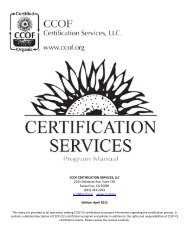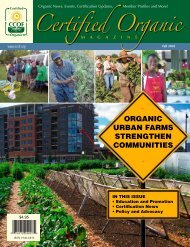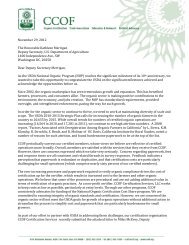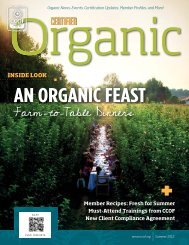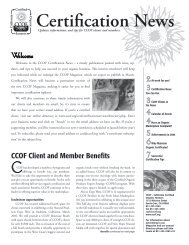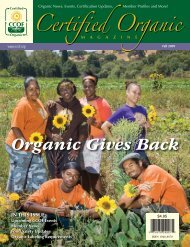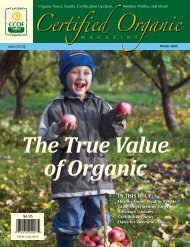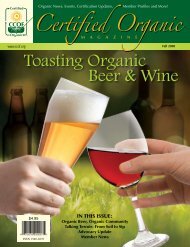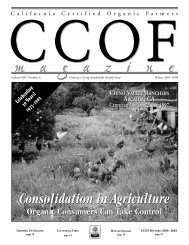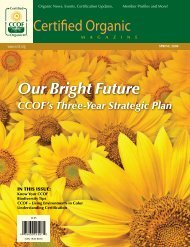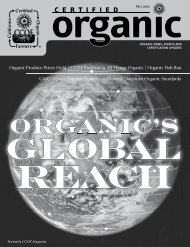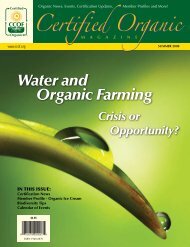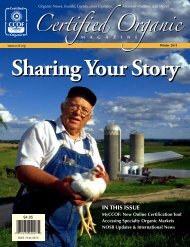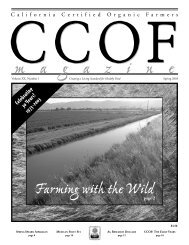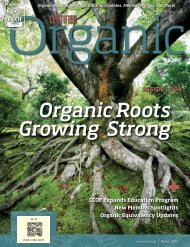CCOF International Standard Progam Manual DISINTEGRATED
CCOF International Standard Progam Manual DISINTEGRATED
CCOF International Standard Progam Manual DISINTEGRATED
You also want an ePaper? Increase the reach of your titles
YUMPU automatically turns print PDFs into web optimized ePapers that Google loves.
the organic status of an operation even if circumstances<br />
are beyond the control of the operator.<br />
2.11 SUPPLY CHAIN CERTIFICATION REQUIREMENTS<br />
All suppliers of products, or ingredients used to produce<br />
products, that are certified to this standard must also be<br />
certified to the EC 834/2007 directly or to a standard<br />
listed by the European Commission as equivalent to EC<br />
834/2007.<br />
The following products/ingredients may be used in<br />
products certified to this standard:<br />
<br />
<br />
<br />
<br />
Those certified directly to the EU standards<br />
anywhere in the world<br />
Those certified to the USDA National Organic<br />
Program where final packaging or processing is in<br />
the US. Any apples or pears must be verified as<br />
being grown without the use of antibiotics.<br />
Those certified to the Canadian Organic Regime<br />
standards and verified as 100% Canada grown.<br />
Those certified to standards or by control bodies<br />
listed as equivalent by the EU commissionsubject<br />
to change, see EU list to verify current<br />
approvals [Articles 33(2) and 33(3)].<br />
The following products/ingredients may not be used in<br />
products certified to this standard without additional<br />
requirements:<br />
Those certified to the USDA National Organic<br />
Program but where final processing or packaging<br />
does not occur in the United States.<br />
Those certified to the Canadian Organic Regime<br />
but not 100% Canada grown.<br />
Contact <strong>CCOF</strong> if you are seeking to export products from<br />
either of these categories.<br />
SECTION THREE: <strong>CCOF</strong> INTERNATIONAL<br />
STANDARD<br />
The <strong>CCOF</strong> <strong>International</strong> <strong>Standard</strong> for crop production and<br />
processing/handling certification is outlined below.<br />
Operations seeking certification to the <strong>CCOF</strong> <strong>International</strong><br />
<strong>Standard</strong> must also meet all applicable provisions of the<br />
NOP regulations in <strong>CCOF</strong> NOP <strong>Standard</strong>s <strong>Manual</strong><br />
Areas below described as “Determined to be equivalent<br />
to NOP” have been determined by <strong>CCOF</strong> CS to be included<br />
as a requirement entry-level NOP organic certification,<br />
and no additional requirements exist for certification to<br />
the <strong>CCOF</strong> <strong>International</strong> <strong>Standard</strong>.<br />
TERM DEFINITIONS<br />
Factory Farm- A farm in which the animal spends its<br />
entire life indoors and there is a high stocking rate of<br />
animals in the facility.<br />
Handle- To sell, process, or package agricultural products,<br />
except such term shall not include the sale,<br />
transportation, or delivery of crops or livestock by the<br />
producer thereof to a handler. A handling scope<br />
certification is required for anyone engaged in processing.<br />
Handler- Any person engaged in the business of handling<br />
agricultural products, including producers who handle<br />
crops or livestock of their own production, except such<br />
term shall not include final retailers of agricultural<br />
products that do not process agricultural products. A<br />
handling scope certification is required for anyone<br />
engaged in processing.<br />
Handling operation- Any operation or portion of an<br />
operation (except final retailers of agricultural products<br />
that do not process agricultural products) that receives or<br />
otherwise acquires agricultural products and processes,<br />
packages, or stores such products. A handling scope<br />
certification is required for anyone engaged in processing.<br />
Conversion- The act of certification to organic standards<br />
of a conventional operation. The practices and<br />
requirements for certification are defined within each<br />
regulation.<br />
Parallel Production- Growing the same crop variety both<br />
organically and non-organically within the same<br />
production unit.<br />
3.1 <strong>CCOF</strong> USDA ORGANIC CERTIFICATION<br />
All <strong>CCOF</strong> CS clients enrolled in the <strong>CCOF</strong> <strong>International</strong><br />
<strong>Standard</strong> program must be certified to the USDA Organic<br />
<strong>Standard</strong>s. The NOP program, including the fees for<br />
service, is described in the <strong>CCOF</strong> Certification Program<br />
<strong>Manual</strong> and the <strong>CCOF</strong> NOP <strong>Standard</strong>s <strong>Manual</strong>.<br />
3.2 COMPLAINT LOG REQUIREMENT 24<br />
The operation must keep a record of all complaints<br />
received that relate to a product’s compliance with the<br />
<strong>CCOF</strong> <strong>International</strong> <strong>Standard</strong>. A record of all complaints<br />
must be made available to <strong>CCOF</strong> CS when requested. The<br />
record must show that appropriate action is taken with<br />
respect to each received complaint.<br />
3.3 ORGANIC PRODUCT LABELING REQUIREMENTS<br />
<strong>CCOF</strong> clients must disclose all labels and brands<br />
manufactured under <strong>CCOF</strong> certification(s), including<br />
24<br />
ISO/IEC 17065 Guide 4.1.2.2.j<br />
<strong>CCOF</strong> <strong>International</strong> <strong>Standard</strong> Program <strong>Manual</strong> Edition: October 2013 Page 8 of 13



